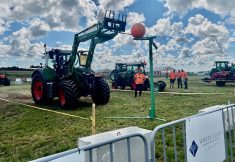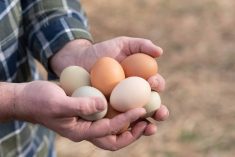The last time I interviewed Carson Callum, general manager of the Manitoba Beef Producers, it was late November. I signed off with something like, “Thanks, Carson. I’m sure we’ll talk again soon.”
It’s a bit of a throwaway line, one I might say to any spokesperson after an interview, but his response made me chuckle.
“Sure thing, Don,” he said. “Maybe next time we can talk about something other than agricultural Crown lands.”
Read Also

Spoken questions are what make it an interview
Recently, I was exchanging emails with the media email account at a government agency, hoping to reach a source for…
The agricultural Crown lands (ACL) file has been a serious issue for producers, particularly in the Parkland and Interlake where more people are reliant on forage leases. The Co-operator has heard producers discuss how changes to the system have affected their livelihoods and succession plans. They’ve expressed frustration as, in their view, agriculture minister after agriculture minister has fumbled the ACL ball and passed it to a successor.
The file has gone through two elections, three premiers, four agriculture ministers, and a flood of criticism from opposition parties and farmers. Producer anger has been tangible.
So, while I chuckled at Callum’s response, I do not make light of the issue.
It’s facets can’t be encapsulated by looking only at 2023. They stretch back to the time when Manitoba was looking to join the New West Partnership Trade Agreement between the Western provinces.
The groundwork to switch the ACL program from a points-based system to allocation by tender was laid in late 2017, and the change came into effect the following year. Then came debate over the regulations and, once those were released in fall 2019, a surge of leaseholder outrage followed.
Despite a deluge of criticism, letters to the editor and threats of legal action, the governing P.C.s, for the most part, didn’t budge on those regulatory changes, except for an early concession to add right of renewal for existing leaseholders who had suddenly had their terms shrink from 50 years to 15.
That changed in late 2022, when the province re-opened the file. Then ag-minister Derek Johnson launched a survey to get ranchers’ opinions on the issue. Results the following spring surprised no one.
“Every point they have in there is exactly what we told them four years ago,” said Brent Benson, president of the Manitoba Crown Land Leaseholders Association.
One of the biggest sticking points of the 2019 regulatory changes (along with a jump in rental rates) was the elimination of unit transfers — the ability to transfer lease rights with the farm when it is sold. Survey results showed 85 per cent of respondents wanted the unit transfer provision back.
The following round of regulatory changes announced in 2023 under Johnson did calm the waters. Among them was a provision to allow 15-year leaseholders to transfer the remaining years of their leases to an eligible third party. Another allowed legacy leaseholders to transfer their leased land by nominating the next leaseholder. It wasn’t exactly reinstatement of the unit transfer, but it did address some producer concerns.
The proposed changes were well received by the leaseholders association.
“We appreciate the hard work the agriculture minister’s office and department staff did on this file to get it done in such a short time frame,” said Benson at the time. “But they will have to forgive us if we watch warily for the implementation.”
The changes were also met with speculation, (denied by Johnson), that the looming October election, combined with slumping poll numbers, had something to do with the government’s sudden willingness to play ball.
It wasn’t perfect, but it looked like the dust might settle on the ACL issue.
Then the election writ dropped.
To sweeten the pot on the file, the P.C.s promised to make permanent a 50 per cent temporary rent reduction that had been in place for 2023. For its part, the NDP campaigned on reversing the changes to ACL regulations. The party said it would reinstate unit transfers.
The NDP won the election, including the area near Dauphin where many farmers use Crown lands for forage and grazing. It is represented by current Agriculture Minister Ron Kostyshyn, and some pundits suggest he was able to reclaim his former seat, in part, by leveraging local anger over the ACL issue.
That brings us to today.
The first thing the new government did on the issue was extend 2022’s temporary rent reduction into 2024. Some leaseholders hoped for a more meaningful announcement but, then again, the Crown lands issue has many parts, and changes can’t easily be made with one stroke of a pen.
It remains to be seen if the issue continues to be a political hot potato, but it is clear that the saga continues.
It also means my late-November chat about ACL with MBP’s Callum will not be the last.
Sorry, Carson.
















